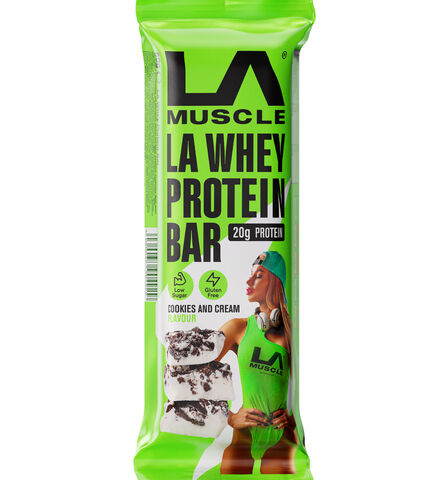Sunday, 18th January 2009
Magnesium - Just what you need?
This is possibly one of the most useful articles you will read all year. Essential reading for athletes, women with PMS, allergy sufferers and those who are anxious and stressed.
By LA Muscle on 18.01.2009 11:23 am
I have always had an interest in Magnesium. I never really knew why! This was until I started researching it. I believe that by reading this article, you too will know why Magnesium could be one of the most important minerals for your body. This amazing substance has vast implications for women, athletes, people suffering from allergies and health problems.

Magnesium (Mg) is a trace mineral that is known to be required for several hundred different functions in the body. A significant portion of the symptoms of many chronic disorders are identical to symptoms of magnesium deficiency.
There are over 200 published clinical studies documenting the need for magnesium. In fact, at the 1992 American College of Cardiology annual meeting, a biography on magnesium was the most often requested item.
Common conditions such as anxiety, migraines, muscle cramps, irritable bowel syndrome, attention deficit disorder, fibromyalgia, asthma and allergies have all been linked to Magnesium deficiency. In fact many people suffer from all these conditions in their body. More below…
Asthma
In the complementary medicine world, Asthma is often associated with high consumption of dairy products and wheat-based products. A different view is that Asthma is often caused by Magnesium deficiency. Magnesium sulfate is used as a treatment for asthma. Magnesium is known to be important for proper lung functioning.
A study from Brown University showed remarkable improvement in children with asthma who were treated with intravenous magnesium. [Arch Pediatr Adolesc Med. 2000 Oct;154(10):979-83. Higher-dose intravenous magnesium therapy for children with moderate to severe acute asthma. Ciarallo L, Brousseau D, Reinert S. Department of Pediatrics, Brown University School of Medicine, Providence, RI, USA.] Low polymorphonuclear magnesium content has been observed in patients with bronchial asthma. The study authors believe that polymorphonuclear magnesium content may have an important role in causing asthma.
Anxiety, stress and Psychiatric Disorders
Magnesium deficiency causes increased levels of adrenaline, which can lead to a feeling of anxiety. Magnesium deficiency intensifies adverse reactions to stress that can be life-threatening. Such reactions are mediated by excess release of the stress hormones which are increased by low Mg and high Calcium levels, and which further lower tissue Mg. It is believed that those who are stressed, feel anxious, have a tight chest or are not generally relaxed can be deficient in Magnesium.
Allergies and Chemical Sensitivities
Food allergies are usually associated with low hydrochloric acid levels and poor digestion. Hyaluronic acid is dependent upon magnesium for its synthesis.
Low stomach acid leaves food undigested and fermenting in the intestinal tract. This fermentation causes gas, bloating and stomach upset, the symptoms of irritable bowel syndrome. Low stomach acid levels reduce levels of beneficial intestinal bacteria which is needed for absorption of Magnesium. Undigested and fermented food causes the body to raise histamine levels, which produce allergic reactions. This is why people take antihistamines for allergies, to lower histamine levels. Interestingly, Magnesium is needed to reduce histamine levels. If you have an allergy and you currently take anti-histamines, it may well be worth your while to try supplementing with Magnesium for a while. Try 400-800mgs a day.

What are the symptoms of Magnesium Deficiency?
This is staggering:
hypertension (cardiovascular disease, kidney and liver damage), peroxynitrite damage (migraine, multiple sclerosis, glaucoma, Alzheimer's disease recurrent bacterial infection, fungal infections due to a depressed immune system, thiamine deactivation (low gastric acid, behavioral disorders), premenstrual syndrome Calcium deficiency (osteoporosis, hypertension, mood swings), tooth cavities, hearing loss, diabetes type II, cramps, muscle weakness, impotence, aggression (lack of NO), fibromas, K deficiency (arrhythmia, hypertension, some forms of cancer) [Med Hypotheses. 2001 Feb;56(2):163-70., The multifaceted and widespread pathology of magnesium deficiency. Johnson S.], twitches, cramps, muscle tension, muscle soreness, including back aches, neck pain, tension headaches, Jaw Joint Pain, chest tightness, a peculiar sensation that one can't take a deep breath. Sometimes a person may sigh a lot. In traditional Chinese Medicine, this is often seen as the body needing to release Chi to rebalance itself.
Symptoms involving impaired contraction of smooth muscles include constipation; urinary spasms; menstrual cramps; difficulty swallowing or a lump in the throat-especially provoked by eating sugar; photophobia, especially difficulty adjusting to oncoming bright headlights in the absence of eye disease, loud noise sensitivity, insomnia, anxiety, hyperactivity and restlessness with constant movement, panic attacks, agoraphobia, and premenstrual irritability, numbness, tingling, and other abnormal sensations, vibratory sensations, palpitations, heart arrhythmias, angina due to spasms of the coronary arteries, high blood pressure and mitral valve prolapse. Not all of the symptoms need to be present to presume magnesium deficiency; but, many of them often occur together. For example, people with mitral valve prolapse frequently have palpitations, anxiety, panic attacks and premenstrual symptoms. People with magnesium deficiency often seem to be uptight (more below). Other general symptoms include a salt craving, both carbohydrate craving and carbohydrate intolerance, especially of chocolate, and breast tenderness.
What foods contain Magnesium?
Whole grains, nuts, seeds and vegetables, preferably food grown on naturally composted soil. The green colour of green vegetables is due to chlorophyll, which is a molecule that contains Magnesium. Try to avoid refined processed foods, especially white sugar and white flour products, as most Magnesium is removed from them.
More specifically, you increase the following in your diet:
- Peanuts
- Pumpkin seeds
- Tofu
- Broccoli
- Spinach
- Chard
- Soybeans
- Sweet potato
- Black beans
- Artichoke
- Broadbeans
You get the idea! Basically, green vegetables contain a great deal of Magnesium. This may explain why people who consume a great deal of meat and very little vegetables are generally more uptight and aggressive than those who consume green vegetables. There have even been proposals that juveniles in prisons receive Magnesium-rich hard water to reduce violence!
According to the U.S. National Academy of Sciences (1977) there have been more than 50 studies, in nine countries, that have indicated an inverse relationship between water hardness and mortality from cardiovascular disease. That is, people who drink water that is deficient in Magnesium and calcium generally appear more susceptible to this disease.
PMS
PMS is a complex of symptoms that occur in some women one-to-two weeks prior to the onset of menstruation and disappears shortly after the onset of menstrual bleeding. PMS occurs in 40% of all women 19 to 45 years of age
There are four groups of symptoms. All together there are more than 200 symptoms which have been attributed to PMS. There is often an intense craving for chocolate in the week to two weeks prior to menstruation. Did you know that chocolate contains high amounts of Magnesium?
The best treatment for PMS has been suggested to be correcting the Magnesium and B6 deficit and eliminating the so-called "Offender Foods", thought to be foods high in calcium, refined sugars and caffeine.
If you suffer from PMS, I strongly suggest you give this a try. I have seen a significant improvement in almost all cases around me. Cut out junk foods, sugars, pastries, white carbs and increase your Magnesium levels.
Magnesium as a training aid for athletes and body builders
A series of studies by Keen and Lowney et al (202-206) showed that decreased exercise capacity can be an early effect of Magnesium deficiency. This is not surprising considering the role of Magnesium in so many functions of the body including hormone production.
Joborn et al found that long-term steady state exercise had little effect on Magnesium levels, but there was a decrease during the first hour of recovery. So possibly the best time to take Magnesium could be immediately after training? Again, you could give this a try and see what happens. Try taking 400mgs of Magnesium immediately after training.
Important studies of long-term Magnesium loss by trained adults undergoing sustained heavy exercise have been reported by Stendig-Lindberg et al (216-219). Healthy young subjects who underwent a 7-month graded physical training program before undertaking a 120-km march (of 22 hours duration) had Magnesium intakes of 340 mg in food and 364 mg Magnesium in water (216). Despite the higher than usual intake, the mean serum Mg pre-march (1.66 mEq/L) fell significantly 1 hour after the march ended to (1.4mEq/L). After rising to almost pre-march levels at 24 hours, it fell again, at 3 days to 1.3 mEq/L; 89% had hypomagnesemia.
Other studies have found that there is a significantly increased urinary Magnesium on exercise, and of post-exercise blood lactate and oxygen consumption during recovery versus a control period
The effect of Magnesium aspartate supplements on the capacity for intense exercise (90 minutes) was reported in 1968 by Ahlborg et al in six young men, the day before, and daily on four days of testing on a bicycle ergometer until complete exhaustion and/or muscle pain required stopping. Those supplemented on day 3 exhibited 50% increased work capacity before muscle pain developed, versus those given placebo. This is an amazing study as if it is correct, Magnesium could be one of the most important supplements you can take for increasing your performance and possibly muscle gains.
Endurance athletes under constant strain, given Magnesium supplements by Boehmer in 1979 did not exhibit the declining Magnesium levels seen in the power athletes not so supplemented, and had better performance and endurance.
Magnesium can definitely help:
- Protect you from heart disease.
- Help lower high blood pressure.
- Help relieve migraines.
- Strengthen exercising muscles and increase endurance.
- Help prevent recurrent kidney stones.
- Work with calcium to protect against postmenopausal bone loss.
I hope I have highlighted just some of the reasons why Magnesium supplementation could be worth considering. I especially would recommend it to:
- Those who take diuretics or too much tea, coffee, caffeine
- Those undergoing cancer chemotherapy
- Those taking digitalis drugs
- Those taking antibiotics
- Heavy drinkers
- Those who have had a heart attack or have a history
- Those who have kidney problems
- Diabetics
Magnesium could be a vital supplement for those with allergies, women who suffer from PMS and athletes. Try supplementing your diet with a Magnesium supplement from a reputable brand and see if you notice a difference.
Ted Beuchamp ITEC
Please note that the above article is not a substitute for medical advice. If you have a medical condition or are uncertain about anything, please refer to your physician.




























